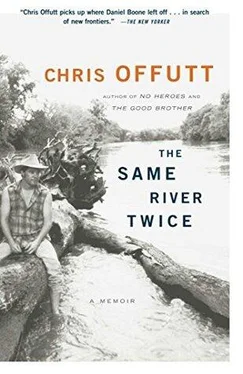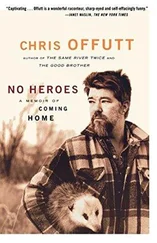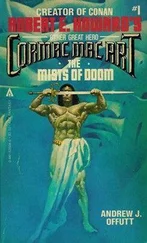A groundhog trail is easy to recognize by the dirt it leaves mixed with snow. My tracks are the most obvious, the tread of boots with a turned-out angle to the stride. They look clumsy beside the elegance of fox prints, the petite mouse trail, the smooth swath left by a beaver’s tail. Rita took a brief walk last week and I studied her tracks. Most humans come down hard on a heel or toe. Hers were balanced, both ends of each foot sunk deep, as she rocked the weight forward and back. She is tired of the house, of winter, of being pregnant. She tells me the payoff is worth the aggravation. For her, birth is an end; for me, the beginning of deeper concern. I am no better at keeping jobs than I ever was. I’ve only gotten better at finding them.
Beaver saliva twinkles in fresh wood chips, and the air is still as a crypt. My crunching footsteps are very loud. The absence of leaves allows me to see farther in the woods than in any other season. Farmers call this weather an open winter — cold and windy, barren as Detroit or the Bronx, sightlines spreading in every direction. I can view my life without obstruction. Everything leads to this moment. An eagle watches me from a mile away.
There are various places in the woods that are special to me, each marking where something occurred on an earlier trip. Nothing distinguishes them save the ghost of memory. Today I am visiting these areas, as comfortable with them as with an old friend. I come to the spot where I stood last fall skipping rocks across the river. One of my stones struck a crappie that was jumping for an insect. The geometry was pure — arcing stone, flashing fish, the sudden collision that left me weak. I felt abandoned by logic, alone as paternity on the rise. Water rejected a rock. The air welcomed a fish.
Last night’s sleet covers every twig and bole with glittering ice, changing each tree to a thousand prisms. Snowflakes float big as nickels. I’m walking a world that sparkles around me. The floor of the woods has hardened like old varnish. Squirrels scurry easily along the veneer, but my boots stay on top for a millisecond before weight and gravity break the crust. My mind slows to the cadence of the frost.
These are the woods of Poweshieck, chief of Mesquakie, the Red Earth People. The remainder of his tribe lives in Tama County now, north of here. Last year Rita and I attended a powwow held in the town’s rec center. White families watched from bleachers as dancers competed beneath basketball goals. They wore costumes passed down through generations. The Mesquakie beat rhythms on a single drum, singing the songs of the past. After the last Indian quilt was raffled off, the white people began to leave the gym.
Bear and panther were eliminated in my grandfather’s day, bobcat and wolf in my father’s. The last passenger pigeon died a captive in 1914. None of us can ever see a sabertooth. In recent years, Old Faithful has lost its fidelity; the spew is erratic and short, the product of land rendered impotent by men. Our species is becoming Icarus with melting wax and loss of altitude. The sea will drink us. The air will breathe us. The soil will eat our mulch.
My boots drop through the brittle surface, and the snow becomes a powdery beach of the lost midwestern sea. The ocean has receded and I am walking with the dodo, the condylarth, the living trilobite. A jetty of land is an open coral reef. Instead of birds, there are feathered creatures learning to glide. I am the only animal on its hind legs, bewildered by the ability to grasp. I become conscious of the self, which marks the fearing of death, our fatal flaw. I wear store-bought hides, lack decent claws and teeth. My nose is ruined from breathing the air of cities, and I need binoculars to aid my vision. A mouse can outrun me with no head start.
I sit on a downed poplar where last spring I found a petrified bullfrog the size of a brick. Its skin was leathery black. The frog’s posture was halted on the verge of a leap, with the bones of its rear legs making humps in its back. It smelled bad. I spoke to a biologist, who asked to see it. He said that last year thousands of frogs had suddenly died and people were concerned. After a couple of days, he called, disappointed that my frog’s death was explainable. It had frozen to death. I hung up the phone thinking about our penchant for uncommon deaths — the woman who is struck by lightning, the worker who drowns in a brewery, the man whose final coronary happens when he is making love. Jesus died in an unusual fashion and we still have not gotten over it.
This morning’s walk ends at a channel that links the river to several ponds. The ice is covered with fox prints in frozen blood, and the oily feathers of a duck. During last year’s high water, I steered my boat up the channel at night and enjoyed the purity of being lost in darkness, surrounded by the calling of owl and frog. Fish also wander into this waterway. Its mouth becomes blocked by brush, and when the water recedes, the fish are trapped in the ponds that slowly dry to mud.
Just before Rita became pregnant, we found a gar halfway along this channel. It was working through mud toward the river. A quick slithering motion yanked its body forward a few inches, where it rested briefly. We stared at a fish on land, dragging itself like a wounded soldier into safe territory. Its sheer exertion was appalling.
The gar is ancient, a throwback with its tough hide and alligator snout filled with dozens of sharp teeth. It is a relentless predator. The eggs of a gar are poison to other fish, so it has not changed much in sixty-five million years. Rita suggested I help the fish, but I refused, preferring not to tamper with nature. Watching a fish on land was like finding a mermaid, farfetched and wondrous.
Rita plunged into the muddy trench, falling several times. The gar got away from her twice. She finally caught it on her knees and grinned at me, mud specking her teeth. The river flowed behind her. She and the gar were covered with muck. Both seemed to have risen simultaneously from the earth. The woods around me faded to a void. I skipped backwards several million years to an antediluvial age when earth and water were more closely connected, when there was less division between dwellers of each. All creatures aspired to the expansive qualities of the amphibian.
Today the mud is hard as clay beneath the snow and ice. I’ll be a father by the time water returns to the channel. The baby is long past its fish stage. Eyes initially occur on the side of its head before slowly moving forward. We are descendants of a Devonian fish, but our arrival on land was due to a failure in water, not to innate superior skills. Dominant forms arise from the lowly, the least specialized, the quickest to adapt. Humans are the underclass of evolution. Every other creature was better equipped.
The curled leaves of a burr oak rasp one another in the wind. The sun is a white glow in the sky. While walking out, I see a bald eagle tuck its wings and drop from the sky like a meteor. At the last second it opens its wings to brake. The talons swing forward and back, shattering the placid surface of water, and the eagle climbs into the air clutching a fish. The vision so discombobulates me that I momentarily forget to breathe. The soaring bird becomes a speck that disappears in the glare of full sunrise.
Decades of DDT have weakened the eggshells of eagles until a female can kill her young merely by warming the eggs. I am stricken by a sudden fear that Rita will fall out of bed and crush the fetus. I hurry home, reminding myself that the placenta is stronger and more complex than a spacesuit. It girdles the baby as the earth once protected all of humanity.
Rita is smiling when I enter the house. Heat from the stove draws steam from my clothes. My face stings. I stare through a mist of my own making, unable to tell her how glad I am that she’s alive. I mention the gar and she nods, her eyes elsewhere, inside. We both glance away. The winter of our intimacy has made us shy.
Читать дальше












